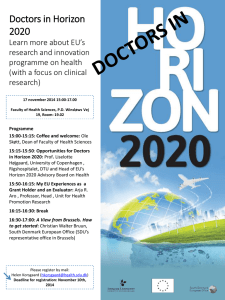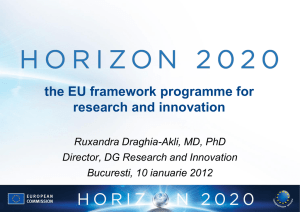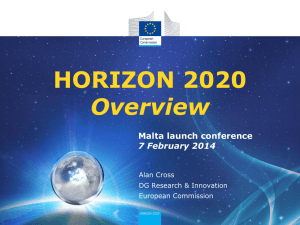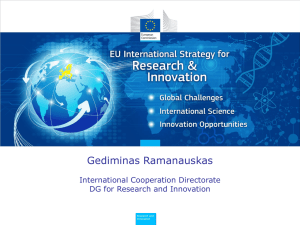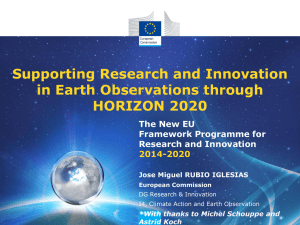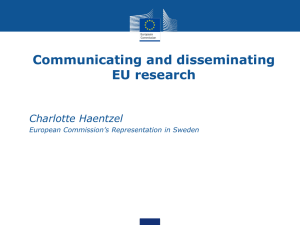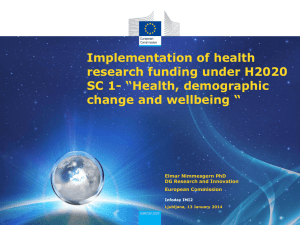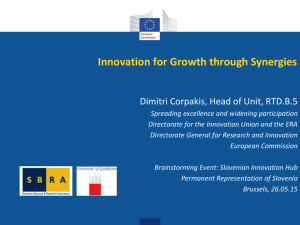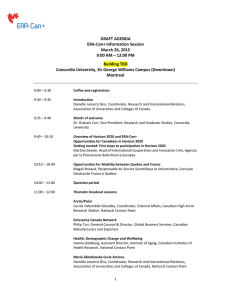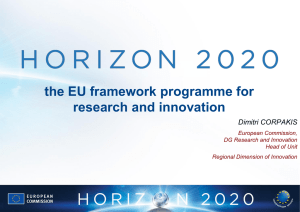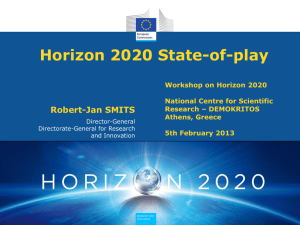Horizon 2020
advertisement
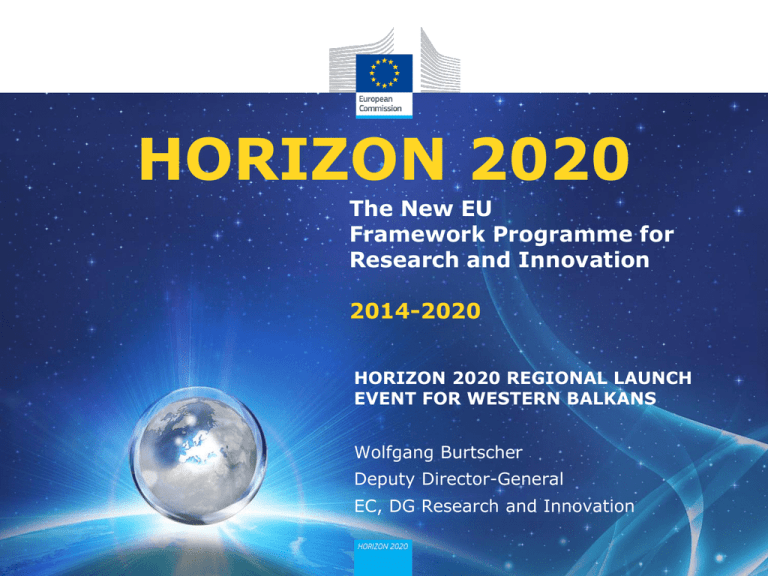
HORIZON 2020 The New EU Framework Programme for Research and Innovation 2014-2020 HORIZON 2020 REGIONAL LAUNCH EVENT FOR WESTERN BALKANS Wolfgang Burtscher Deputy Director-General EC, DG Research and Innovation The Multiannual Financial Framework 2014-2020: European Council conclusions, 8 February 2013 Key challenge: stabilise the financial and economic system while taking measures to create economic opportunities 1. Smart & inclusive growth (€451 billion) Education, Youth, Sport Connecting Europe Cohesion Competitive Business SMEs HORIZON 2020 2. Sustainable growth, natural resources (€373 billion) 3. Security and citizenship (€16 billion) 4. Global Europe (€58 billion) 5. Administration (€61.6 billion) TOTAL €960 billion Investment in R&D is part of the solution to exit from the economic crises The EU's share of world R&D expenditure is declining Global R&D investment, 1995-2010, in % Europe's patent performance is slipping Number of triadic patent families, annual growth rates, 2000-2010 What is Horizon 2020 • Almost €80 billion research and innovation funding programme (2014-2020, current prices including inflation) • A core part of Europe 2020, Innovation Union & European Research Area: − Responding to the economic crisis to invest in future jobs and growth − Addressing people’s concerns about their livelihoods, safety and environment − Strengthening the EU’s global position in research, innovation and technology What's new • A single programme bringing together three separate programmes/initiatives* • Coupling research to innovation – from research to retail, all forms of innovation • Focus on societal challenges facing EU society, e.g. health, clean energy and transport • Simplified access, for all companies, universities, institutes in all EU countries and beyond ⃰ The 7th Research Framework Programme (FP7), innovation aspects of Competitiveness and Innovation Framework Programme (CIP), EU contribution to the European Institute of Innovation and Technology (EIT) Evaluation criteria STANDARD AWARD CRITERIA EXCELLENCE IMPACT ERC frontier Research actions Innovation actions QUALITY & EFFICIENCY OF THE ACTION only EXCELLENCE higher weighting for "IMPACT" Proposal evaluated by the experts “as it is” and not as “what could be” = no need for negotiation Three priorities Excellent science Industrial leadership Societal challenges Almost €80 billion from 2014 to 2020 Priority 1. Excellent science Why: • World class science is the foundation of tomorrow’s technologies, jobs and wellbeing • Europe needs to develop, attract and retain research talent • Researchers need access to the best infrastructures Proposed funding (€ million, 2014-2020)* European Research Council (ERC) Frontier research by the best individual teams Future and Emerging Technologies Collaborative research to open new fields of innovation 13 095 2 696 Marie Skłodowska-Curie actions (MSCA) Opportunities for training and career development 6 162 Research infrastructures (including e-infrastructure) Ensuring access to world-class facilities 2 488 ⃰ All funding figures in this presentation are subject to the pending Multiannual Financial Framework Regulation by the EP and the Council Work Programme 2014 Funding for calls Excellent Science Pillar: ~ €3 billion • European Research Council (4 calls) €1 662 million • Marie Skłodowska-Curie actions (6 calls) €800 million • Future and Emerging Technologies (FET) (4 calls) €200 million • European Research Infrastructures (including e-Infrastructures) (4 calls) €277 million • Priority 2. Industrial leadership Why: • Strategic investments in key technologies (e.g. advanced manufacturing, micro-electronics) underpin innovation across existing and emerging sectors • Europe needs to attract more private investment in research and innovation • Europe needs more innovative small and medium-sized enterprises (SMEs) to create growth and jobs Proposed funding (€ million, 2014-2020) Leadership in enabling and industrial technologies (LEITs) (ICT, nanotechnologies, materials, biotechnology, manufacturing, space) 13 557 Access to risk finance Leveraging private finance and venture capital for research and innovation Innovation in SMEs Fostering all forms of innovation in all types of SMEs 2 842 616 + complemented by expected 20% of budget of societal challenges + LEITs and 'Access to risk finance' with strong SME focus Work Programme 2014 Funding for calls Industrial Leadership Pillar: ~ €1.8 billion Leadership in Enabling and Industrial Technologies (LEITs) • Information and Communication Technologies (ICT) (2 calls) €700 million • Nanotechnologies, Advanced Materials, Biotechnology and Production (5 calls) €500 million • Space (5 calls) €128 million • Access to Risk Finance (financial instruments) (2 calls) €5 million (€ 295 million NOT in calls) • Innovation in small and medium-sized enterprises (1 call) €10 million • SME Instrument €251 million Research and innovation – Crucial for solving societal challenges + Population Food +50% by 2050 +70% by 2050 + Energy Climate +2o by 2050 +100% by 2050 - 17 Policy Research and Innovation Priority 3. Societal challenges Why: • Concerns of citizens and society/EU policy objectives (climate, environment, energy, transport, etc) cannot be achieved without innovation • Breakthrough solutions come from multi-disciplinary collaborations, including social sciences & humanities • Promising solutions need to be tested, demonstrated and scaled up Proposed funding (€ million, 2014-2020) Health, demographic change and wellbeing 7 472 Food security, sustainable agriculture and forestry, marine and maritime and inland water research and the Bioeconomy 3 851 Secure, clean and efficient energy * 5 931 Smart, green and integrated transport 6 339 Climate action, environment, resource efficiency and raw materials 3 081 Inclusive, innovative and reflective societies 1 310 Secure societies 1 695 Science with and for society 462 Spreading excellence and widening participation 816 ⃰ Additional funding for nuclear safety and security from the Euratom Treaty activities (2014-2018) Work Programme 2014 Funding for calls Societal Challenges Pillar: ~ €2.8 billion • Health, demographic change and wellbeing (2 calls) €600 million • Food Security, Sustainable Agriculture and Forestry, Marine and Maritime and Inland Water Research and the Bioeconomy (3 calls) €300 million • Secure, clean and efficient energy (4 calls) €600 million • Smart, green and integrated transport (3 calls) €540 million • Climate action, environment, resource efficiency and raw materials (3 calls) €300 million • Europe in a changing world – inclusive, innovative and reflective societies (5 calls) €112 million • Secure Societies (4 calls) €200 million In addition • Spreading Excellence and Widening Participation (3 calls) €50 million • Science with and for Society (4 calls) €45 million Horizon 2020 and partnering Public private partnerships: • Through Joint Technology Initiatives or other formal structures (Art. 187) • Through contractual agreements, which provide inputs for work programmes • Only when criteria met, e.g. clear commitments from private partners Public public partnerships: • Through « ERA-Nets » for topping up individual calls/actions (replacing current ERA-Net, ERA-Net Plus, Inco-Net, Inno-net) • Through participation in joint programmes between Member States (Art. 185) • Supporting agendas of Joint Programming Initiatives when in line with Horizon 2020 • Only when criteria met, e.g. financial commitments of participating countries European Innovation Partnerships: • Not funding instruments, but for coordination with broader policies and programmes Innovation Investment Package €22 billion Innovation Investment Package Joint Technology Initiatives (under Article 187) • • • • • Innovative Medicines Initiative 2 Clean Sky (Aeronautics) 2 Fuel Cell and Hydrogen 2 Bio-based Industries Electronic components and systems Joint programmes (under Article 185) • European and Developing Countries Clinical Trials Partnership (EDCTP) 2 • European Metrology Research Programme 2 • Eurostars (for SMEs) 2 • Active and Assisted Living 2 Benefits of Partnerships Joint Technology Initiatives (with industry) • • • • • • Industry driven research agenda Fixed budget for 7 years to leverage more industry investment Sector structuring to achieve impact Coverage of longer value chains and interrelated sectors Higher level of SME participation (30%) than in FP7 Links and synergies with Structural and Investment Funds Joint programmes (with Member States) • • • • Link to national programmes Leverage effect Industry involvement Cross-border collaboration Role of the EIT and JRC in Horizon 2020 Proposed funding (€ million, 2014-2020) European Institute of Innovation & Technology (EIT) Combining research, innovation & training in knowledge and Innovation Communities Joint Research Centre (JRC)* Providing a robust, evidence base for EU policies ⃰ Additional funding for the JRC for Euratom Treaty activities 2 711 1 903 EURATOM Budget: €1.603 billion (2014-2018) to support Fusion and Fission indirect actions and nuclear direct actions of the JRC Duration of the Programme - 5 years, in line with the Euratom Treaty What is new? • Euratom Programme complements Horizon 2020 and addresses the same key challenges; • The same rules for participation apply to Horizon 2020 and Euratom Programme; • A streamlined fusion research programme focusing on the implementation of the fusion roadmap; • A single regulation instead of four separate decisions during FP7 Socio-economic sciences and humanities (SSH) • Integrated approach: SSH included as an integral part of the activities, working beyond 'silos' (e.g. understanding the determinants of health and optimising the effectiveness of healthcare systems) • The 'Inclusive and reflective societies' challenge: issues such as smart and sustainable growth, social transformations, social innovation and creativity, the position of Europe as a global actor as well as the social dimension of a secure society (SSH have the tools to contribute to addressing security challenges, enhancing the societal dimension of security policy and research) • Bottom-up funding: ERC, MSCA, Research Infrastructures Strong focus on SMEs • 20% of budget from societal challenges and LEITs • New SME instrument > €500 million in 2014-2015 • Support measures under 'Innovation in SMEs' • Access to risk finance • Participation with Member States (Public-Public) Eurostars joint programme Widening participation • Principle of excellence: continue to allocate funding on the basis of competitive calls, selecting only the best projects • Clear division of labour between cohesion policy and Horizon 2020 Cohesion policy: support for regions in building up their research and innovation capacity Horizon 2020: widen participation, better coordination between the two Union funding programmes, support policy learning reforms • Accompanying measures in Horizon 2020 to ensure that excellence prevails wherever it exists, including: twinning, ERA chairs, support for access to international networks, development of smart specialisation strategies International cooperation Principle of general openness the programme will remain the most open funding programme in the world Open to the association of enlargement countries / EFTA / European Neighbourhood (and others associated to FP7) Targeted actions to be implemented taking a strategic approach to international cooperation Major Simplification for the benefit of applicants 1. A single set of rules for all funding under Horizon 2020 Fewer, more flexible, funding instruments 2. Simpler reimbursement: 1 project = 1 funding rate 100% of the total eligible costs (70% for innovation actions) Non-profit legal entities can also receive 100% in innovation actions Single flat rate for indirect costs (25% of eligible costs) 3. Faster time to grant Within 8 months of call deadline Major Simplification for the benefit of applicants 4. Fewer, better targeted controls and audits 5. Coherent implementation Through dedicated agencies Single IT system 6. Simplification in grant agreements Simpler access through the Participant Portal • Single entry point from calls to electronic submission of proposals • New tools for smart searches for the benefit of users, including newcomers to the programme. FP7 participation *This designation is without prejudice to position on status and is in line with UNSCR 1244/99 and the ICJ Opinion on Kosovo's declaration of Independence. HORIZON 2020 Thank you for your attention! Find out more: www.ec.europa.eu/horizon2020
